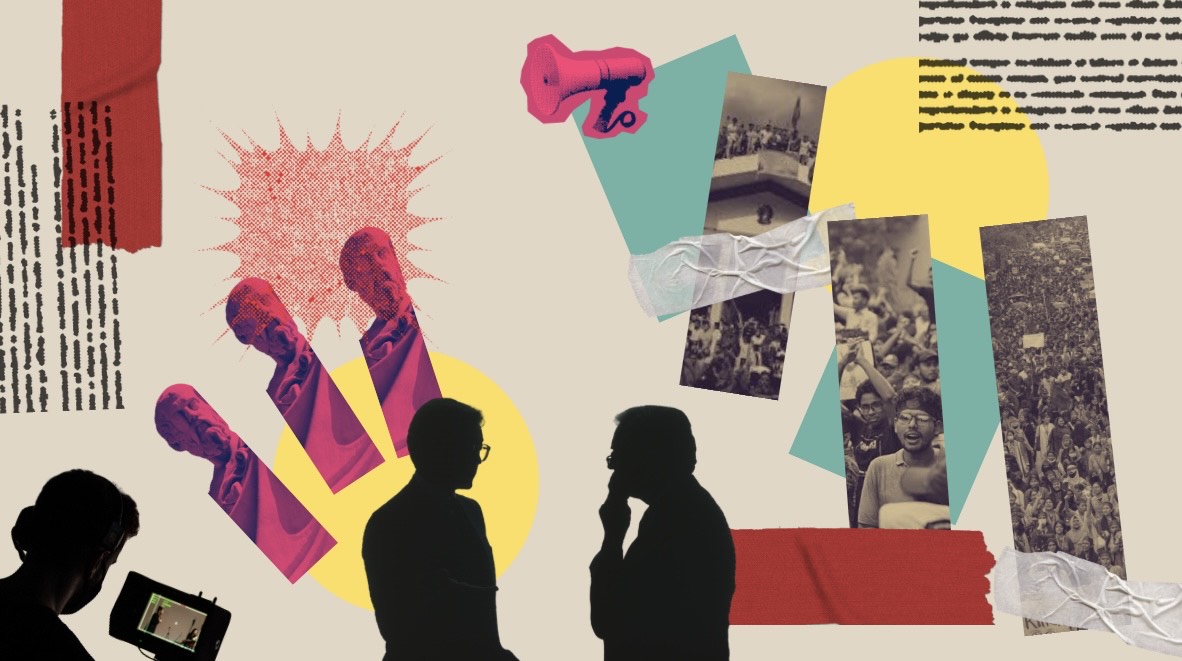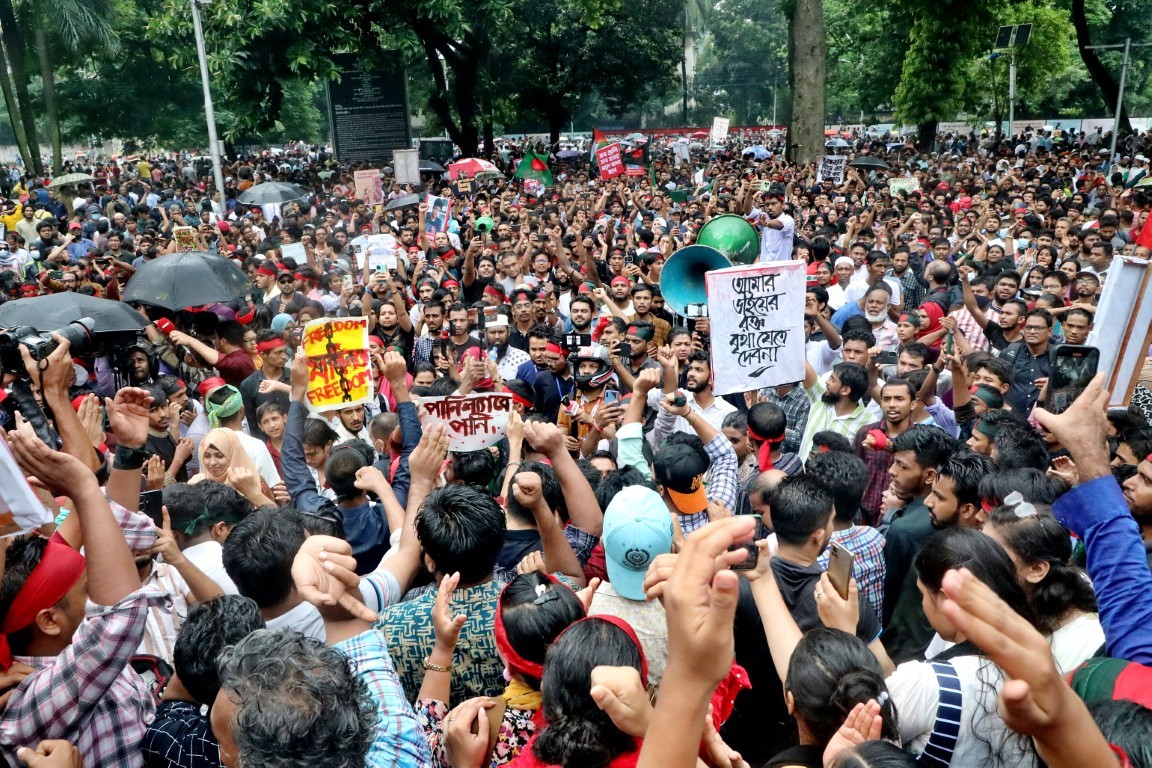The weight of counterfactuals in Bangladesh’s politics

"Cleopatra's nose, had it been shorter, the whole face of the world would have been changed."
– Blaise Pascal, Pensées (1670)
History is never merely a record of what happened; it is also haunted by what might have happened otherwise. This is the realm of the counterfactual: thinking about history through "what if" scenarios. Pascal's famous remark about Cleopatra's nose underscores the fragility of events and the disproportionate consequences of contingencies. The point is not the physical feature itself but the insight it offers: the past was never predetermined, and history could easily have taken different turns.
For Bangladesh, the July uprising in 2024 that ousted Sheikh Hasina offers a reminder of this fragility. What if the uprising had failed? Authoritarianism might still be entrenched, dissent muted, and cronyism unchecked. That it did not fail suggests how even the most ossified systems can suddenly give way—how history always contains the seeds of the unexpected. Counterfactual thinking sharpens this awareness: democracy nearly materialised at different moments before, and thus remains possible now.
Unlike the deterministic chaos theory in the natural sciences, which studies how tiny differences in initial conditions produce unpredictable outcomes within strictly deterministic systems, counterfactuals are interpretive tools. Chaos theory uncovers hidden order within randomness; counterfactual thinking insists that history has no inevitability—only paths chosen and paths foreclosed. It foregrounds human agency, political choices, and the interplay of structure and contingency. By asking "what might have been," we illuminate the fragility and openness of political life.
Counterfactuals do not rewrite history. Rather, they show that outcomes were shaped by choices, accidents, and circumstances that could have gone another way. In fragile democracies like Bangladesh, counterfactuals often expose missed opportunities and compel us to reflect on the stakes of decision-making.
Why counterfactuals matter
Counterfactuals sharpen political analysis in two ways. First, they clarify causality: asking "What if X had not occurred?" highlights why X mattered and how it shaped subsequent developments. Second, they reveal the stakes of choices: what might have been gained or lost. In Bangladesh, where democracy remains precarious, counterfactuals remind us that crises are not inevitable. They are produced by decisions, betrayals, and failures of imagination. Thinking counterfactually insists that things could have been otherwise, and that democratic renewal remains thinkable precisely because it almost materialised before.
What if the Mujib-Zia assassinations hadn't happened?
Sheikh Mujibur Rahman's assassination in August 1975 was the original trauma of independent Bangladesh. It unleashed coups and counter-coups that derailed the democratic promise of 1971. Had Mujib lived, would Bangladesh have matured into a functioning democracy, or would his centralising tendencies—as epitomised by BAKSAL—have hardened into autocracy? His charisma and legitimacy might have stabilised the nation, yet his concentration of power risked suffocating pluralism.
The counterfactual exposes a tragic paradox: the architect of liberation may have inadvertently laid the foundation for authoritarianism. Could Mujib have recalibrated BAKSAL towards inclusivity, decentralising authority to accommodate diverse voices? Or was the trajectory already fixed towards centralisation? Even leaders with immense legitimacy are constrained by structural and personal tendencies that can distort political outcomes.
Ziaur Rahman's assassination in 1981 foreclosed the possibility of a gradual evolution towards stability. He sought to institutionalise pluralism through grassroots local government and by expanding political space beyond Awami League. Had he survived, might Bangladesh have developed a sturdier democratic framework, or would reliance on military patronage have eroded civilian supremacy? His reforms were ambitious but tethered to fragile compromises, including reintegrating actors who had opposed the Liberation War.
The counterfactual reveals Zia's precarious balance—expanding pluralism while remaining dependent on military guardianship. His survival might have steered Bangladesh towards democratisation, but also risked entrenching military oversight.
Viewed contrapuntally, the counterfactuals of Sheikh Mujibur Rahman and Ziaur Rahman reveal a layered tension in Bangladesh's early trajectory. Mujib's centralisation promised decisive governance but risked suppressing pluralism, while Zia's decentralisation expanded political space yet relied on the military. Imagining Mujib's survival raises the question of authoritarian consolidation versus inclusivity; imagining Zia's survival highlights the paradox of democratisation from above.
Taken together, these counterfactuals show that Bangladesh's fragility was not merely the result of assassinations but rooted in deeper contradictions: oscillation between centralisation and pluralisation, civilian ambition and military tutelage. What might have stabilised democracy under one scenario could equally have entrenched authoritarianism under another. These "roads not taken" form a polyphonic counterfactual narrative in which Bangladesh's path is contingent, contested, and never predetermined.
Echoes of missed possibilities
Later turning points echo these early ruptures:
1990: What if the mass uprising had failed to topple Ershad? Prolonged military rule might have replaced democratic restoration.
2007-08: What if the caretaker government had institutionalised itself? Military-backed technocracy might have replaced democracy in the name of reform.
2014: What if the boycotted election had been participatory? One-party dominance and democratic decay might have been avoided.
2024: What if the July uprising had failed? Bangladesh might still be mired in authoritarianism, dissent stifled and cronyism unchecked.
Viewed together, these counterfactuals extend the shadow of the 1975 and 1981 assassinations. The oscillation between democratic aspiration and authoritarian relapse has persisted, as if the nation remains trapped in cycles set in motion by its early ruptures.
Counterfactuals as political imagination
Counterfactuals are not mere intellectual games; they fuel protest, shape narratives, and sustain hope. Citizens often articulate grievances in counterfactual terms, "Things could have been different if only…" Opposition parties mobilise around such claims, arguing that elections were stolen or reforms betrayed. Even authoritarian regimes weaponise counterfactuals, warning that without their grip, chaos would ensue.
In Bangladesh, the counterfactual plays a double role: both lament for missed opportunities and horizon of possibility. It reminds us that setbacks were contingent, not inevitable, and that renewal remains possible, precisely because it once almost was. To dwell on counterfactuals is not nostalgia but vigilance, the awareness that alternative futures remain open, demanding action in the present.
The limits of counterfactuals
Yet, counterfactuals carry risks. They can romanticise paths that may not have led to better outcomes. They can become partisan weapons, each side claiming vindication if only events turned differently. Worst of all, obsession with "what might have been" can paralyse action, trapping politics in shadows rather than clarifying "what must be done now."
Counterfactuals must serve as mirrors, not escapes: sharpening our understanding of how choices matter without substituting for deliberate action.
Bangladesh's politics has been shaped almost as much by what did not happen as by what did. The assassinations of Sheikh Mujibur Rahman and Ziaur Rahman cut short divergent paths—Mujib's centralisation and Zia's hybrid democratic experiment—casting long shadows over later democratic possibilities: 1990, 2007-08, 2014, and 2024. Counterfactual thinking is not idle speculation but political vigilance. It reminds us, with Pascal, that even small contingencies—a nose, a vote, or two assassinations—can alter a nation's destiny.
"The heart has its reasons which reason knows nothing of," Pascal wrote. Counterfactuals cannot change the past, but they remind us that history was never inevitable and that the future remains open. In a country where democracy still hangs in the balance, counterfactuals serve as both lens and compass, showing that democracy nearly emerged more than once, and may yet emerge if imagination is joined with action.
Dr Faridul Alam is a retired academic and writes from New York City, US.
Views expressed in this article are the author's own.
Follow The Daily Star Opinion on Facebook for the latest opinions, commentaries and analyses by experts and professionals. To contribute your article or letter to The Daily Star Opinion, see our guidelines for submission.




 For all latest news, follow The Daily Star's Google News channel.
For all latest news, follow The Daily Star's Google News channel. 


Comments